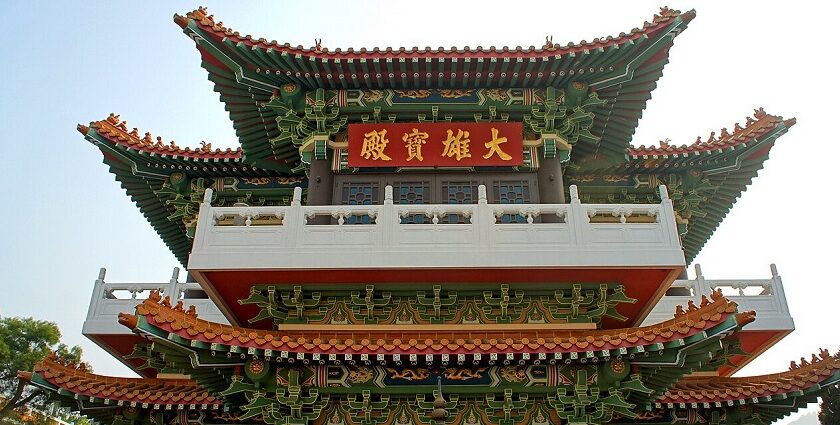Temples in Hong Kong offer a peaceful escape into the city’s deep-rooted spiritual and cultural traditions. These sacred sites are known for their rich history, ornate architecture, and calming atmosphere. Visitors will find intricately carved altars, burning incense, and rituals that reflect centuries of devotion. From Taoist shrines to Buddhist monasteries, each temple tells its own story. Many are also linked to legends and vibrant local festivals, making them more than just places of worship—they are living cultural landmarks in the heart of a modern metropolis.
12 Holy Temples In Hong Kong
The following are some of the must-see temples in Hong Kong, which encompass culture, spirituality, and architectural beauty.
1. Man Mo Temple
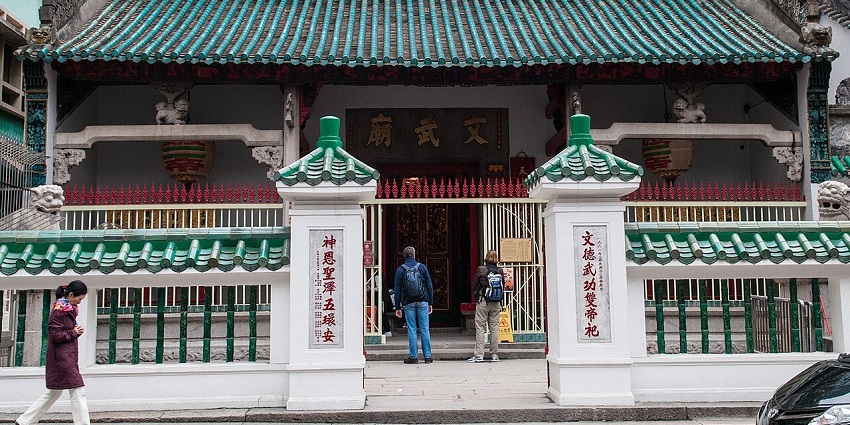
Photo: Michal Osmenda / Wikimedia Commons
Man Mo Temple is one of the oldest temples in Hong Kong because it is dedicated to Man, the God of literature, and Mo, the God of war. When you walk into the temple, feel the thick air with smouldering incense coils hanging from the ceiling. The impressive wooden beams of the temple, granite pillars, and ancient brassware reflect traditional craft that has barely changed over centuries. You can watch devotees light incense and make offerings, and share the sense of reverence that hovers above the temple. There are also quite a few murals and plaques depicting stories of local culture and beliefs.
Location: Hollywood Road, Sheung Wan
Timings: 8 AM – 6 PM
Nearby Attractions: PMQ, Cat Street Market, Soho
Suggested Read: Most Famous Temples In China
2. Wong Tai Sin Temple
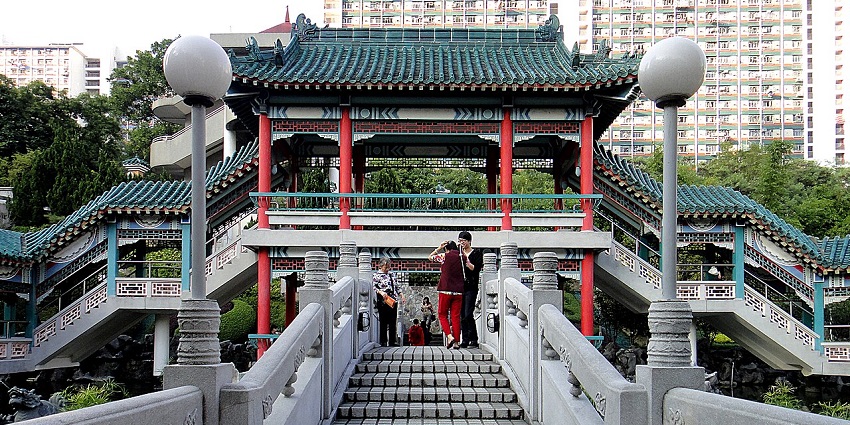
Photo: HK Arun / Wikimedia Commons
Wong Tai Sin Temple is one of the most popular temples in Hong Kong and is dedicated to Wong Tai Sin, a deity who is said to heal the sick and respond to prayers. Once you enter, you can see the reflection of different styles of Taoist, Buddhist, and Confucian practices in its design and rites. The main hall is filled with smoke from the incense offered by worshippers to practise kau cim, a bamboo stick fortune-telling ritual that you can also have a go at. The design of the temple, with its colourful roofs, red pillars, and gold decorations, makes it a vibrant and awe-inspiring site.
Location: Chuk Yuen Village, Kowloon
Timings: 7 AM – 5 PM
Nearby Attractions: Nan Lian Garden, Chi Lin Nunnery, Temple Mall
3. Chi Lin Nunnery Temple
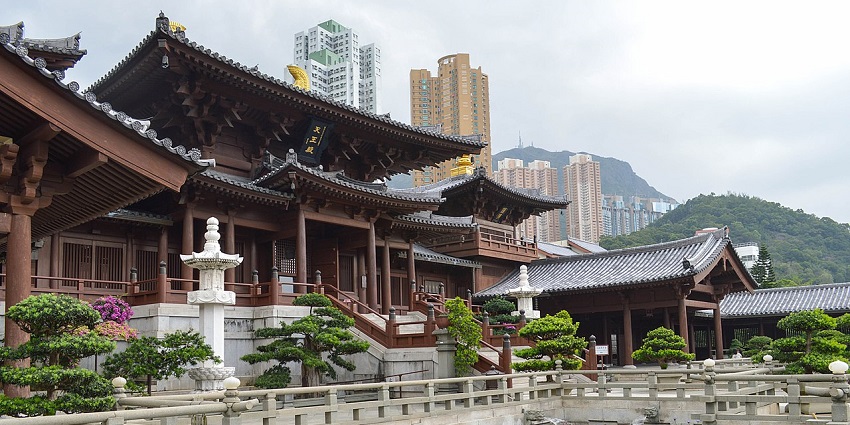
Photo: Francisco Anzola / Wikimedia Commons
The Chi Lin Nunnery Temple is a large Buddhist temple complex constructed using wooden beams and traditional Chinese construction techniques. Walk through the calm courtyards, lotus ponds, and sculpted bonsai trees that create a peaceful space. The main halls include golden statues of Buddha, bodhisattvas, and other deities featuring fine detail, as well as Tang dynasty-era architecture. Each hall is designed with fine detail to allow for balance and harmony. Many people visit for quiet contemplation or to enjoy the environment away from urban noise. The landscaped gardens attached to the temple also give you additional space to slow down and enjoy the scenery.
Location: Diamond Hill, Kowloon
Timings: 9 AM – 4:30 PM
Nearby Attractions: Nan Lian Garden, Plaza Hollywood, Kowloon Walled City Park
Suggested Read: Shaolin Temple
4. Che Kung Temple
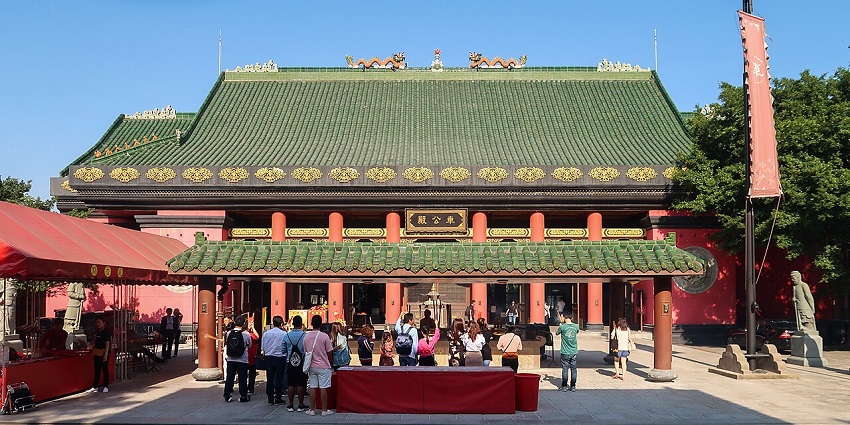
Photo: Wpcpey / Wikimedia Commons
Che Kung Temple is dedicated to Che Kung, a military leader who is associated with protection and strength. Che Kung Temple is one of the famous temples in Hong Kong known for the sheer magnitude of the Che Kung statue, which is giant and golden, and positioned in the middle of the temple surrounded by offerings. The large copper fan windmill thing is a main attraction here and symbolises driving away bad fortune, and that spinning it brings good fortune. The whole temple is incredibly vibrant with lots of red and gold symbolism, which represents additional elements of prosperity and power. You can also see drums, bells, and traditional designs that add to the atmosphere.
Location: Tai Wai, Sha Tin, New Territories
Timings: 8 AM – 6 PM
Nearby Attractions: Hong Kong Heritage Museum, Sha Tin Park, New Town Plaza
5. Pak Tai Temple
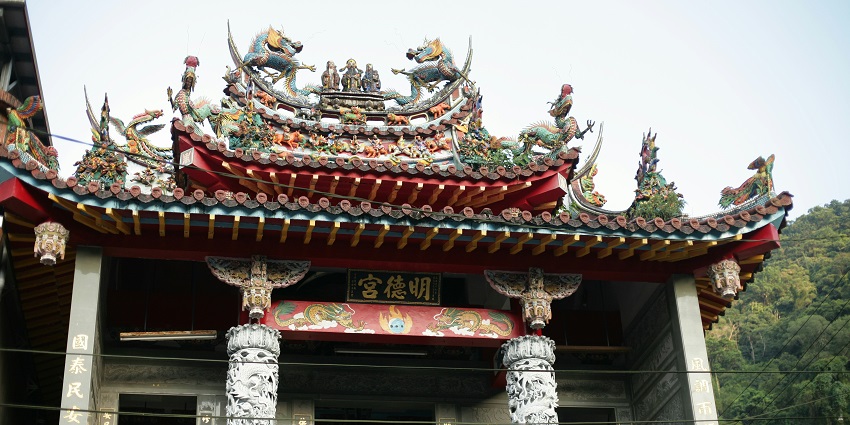
Photo: MChe Lee / Unsplash / Image For Representation Only
Pak Tai Temple is dedicated to Pak Tai, the Taoist God of the North, and is a protector against evil. Inside the temple is a large bronze statue of Pak Tai, more than 400 years old. Throughout the halls, there are wooden carvings, ceramic figurines, and murals to celebrate the different legends of Taoism. You can find ancient relics like stone tablets, iron swords, etc., that provide evidence of the historical culture surrounding the temple. The festivals at Pak Tai Temple are lively, with opera performances and traditional ceremonies creating a vibrant centre for the community. Local people frequently visit to burn incense and pray for safety and peace, and there are usually people performing rituals all day long.
Location: Lung On Street, Wan Chai
Timings: 8 AM – 5 PM
Nearby Attractions: Blue House, Wan Chai Market, Hong Kong Arts Centre
Suggested Read: The Essential Hong Kong Travel Guide
6. Tin Hau Temple, Causeway Bay
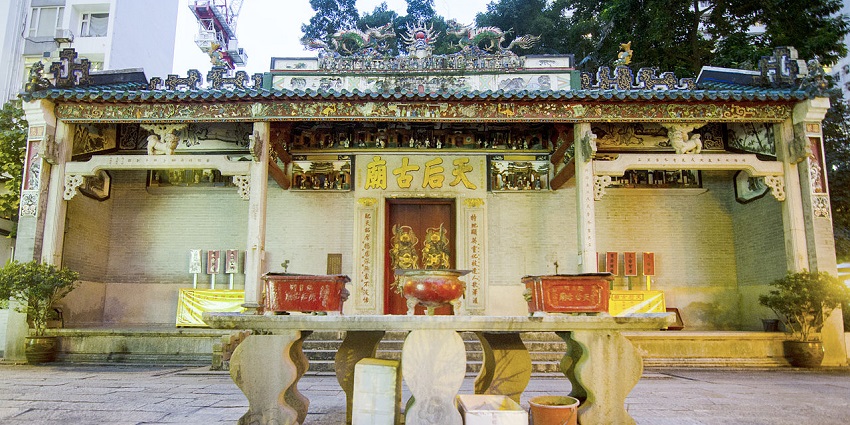
Photo: Kalatpadai / Wikimedia Commons
The Tin Hau Temple in Causeway Bay is devoted to Tin Hau, the Goddess of the Sea, who protects fishermen and sailors. It is a small temple, but very nice inside with dragon carvings, ceramic statues, and a vibrant tiled interior. Incense coils are hanging from the top of the temple, creating a strong, fragrant balance, which strengthens the sacred feel. The temple has a main altar with a statue of Tin Hau used for prayer and worship, hoping for good luck, protection, and safety. Stone lions guard the entrance, and traditional lanterns light the interiors during festival time.
Location: Tin Hau, Causeway Bay
Timings: 6 AM – 6 PM
Nearby Attractions: Victoria Park, Times Square, Hong Kong Central Library
7. Tin Hau Temple, Joss House Bay
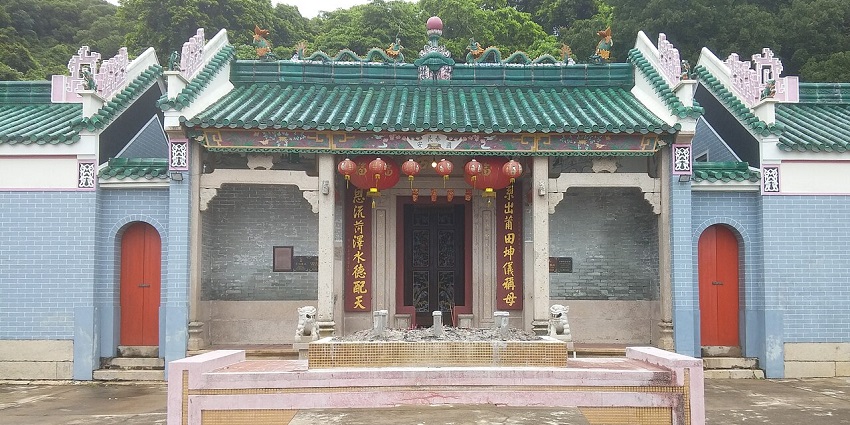
Photo: Will629 / Wikimedia Commons
Joss House Bay is home to Tin Hau Temple, and one of the biggest temples in Hong Kong for worshiping the goddess of the sea. It was built in the 13th century, and has served fishermen as a place of worship for centuries. The complex has several halls, with the main hall housing the statue of the goddess herself. There are stone carvings, ancient Chinese writing, and pictures that add historic value and have been preserved. Every year during the Tin Hau Festival, thousands of worshippers come by boat to the temple, which changes the bay into a culturally-rich, colourful event that includes music, dance, and ritual.
Location: Joss House Bay, Sai Kung
Timings: 8 AM – 5 PM
Nearby Attractions: Clearwater Bay, High Junk Peak, Sai Kung Town
Suggested Read: Things To Do In China
8. Tam Kung Temple
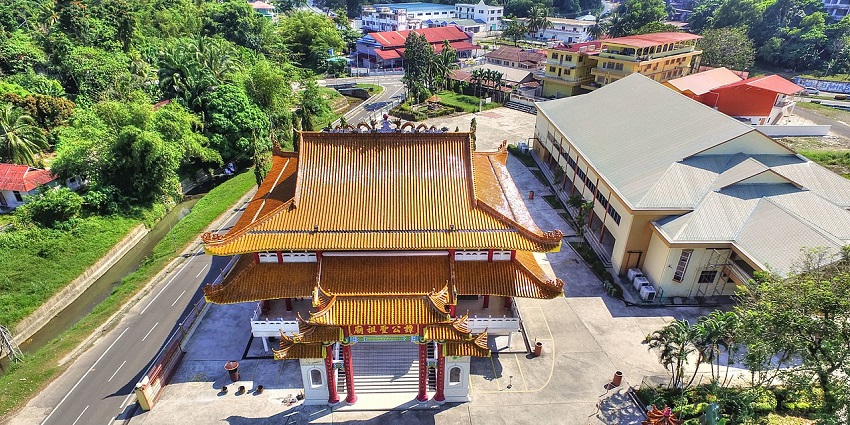
Photo: Steven Tung / Wikimedia Commons
Tam Kung Temple is dedicated to Tam Kung, a sea god who is a guardian for fishermen and sailors. The temple has an interesting blend of folk practices that is different from many temples in Hong Kong that are mostly Taoist. In the middle of the main altar is a statue of Tam Kung surrounded by dragon carvings and paintings to represent power and protection. One of the unique aspects of the temple is the dragon boat model that is displayed inside the main hall and links this temple to the fishing life of the sea. The walls are covered with colourful tiles and murals that tell stories of Tam Kung.
Location: Shau Kei Wan, Hong Kong Island
Timings: 8 AM – 5 PM
Nearby Attractions: Hong Kong Museum of Coastal Defence, Aldrich Bay Park, Shau Kei Wan Market
9. Hung Shing Temple
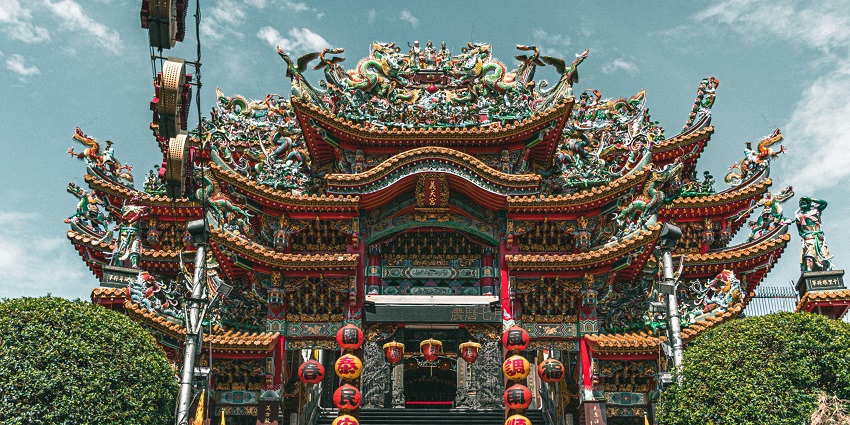
Photo: JUNHØ / Unsplash / Image For Representation Only
Hung Shing Temple is dedicated to Hung Shing, the deity associated with the sea and weather. Fishermen and coastal communities pray for safety and blessings from Hung Shing, and they have come here for generations. Inside the Temple, in the main hall, a statue of Hung Shing stands, with a halo of lanterns and traditional offerings, surrounded by wooden carvings and other decorations. The walls contain plaques and calligraphy that attest devotion by prior worshippers. The Temple is small, but you can admire the many details, including the stone lions at the entrance, the glazed ceramic figures on the roof, and the small temple houses.
Location: Ap Lei Chau, Hong Kong Island
Timings: 8 AM – 5 PM
Nearby Attractions: Aberdeen Fishing Village, Ocean Park, Ap Lei Chau Waterfront Promenade
Suggested Read: Places To Visit In China That Needs To Be In On Your List
10. Kwun Yam Temple
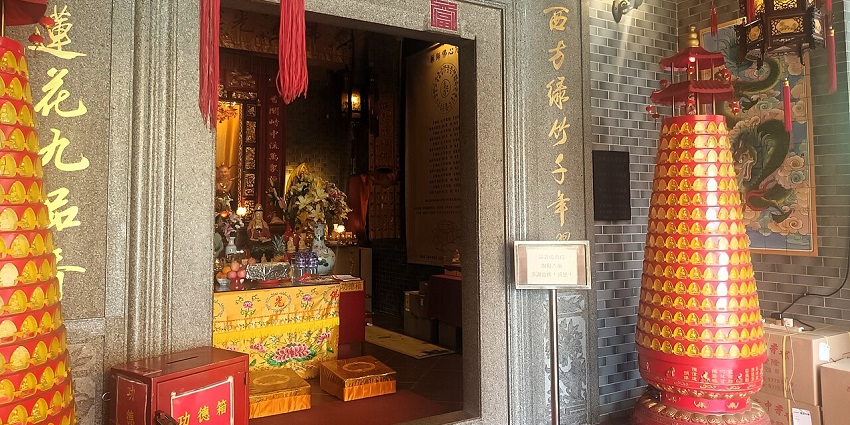
Photo: Underwaterbuffalo / Wikimedia Commons
Kwun Yam Temple is dedicated to Kwun Yam, the Goddess of Mercy, and is noted for compassion and kindness. In its main altar, there is a statue of the goddess, surrounded by flower offerings and incense. This temple is where people pray to Kuwn Yam for inner peace, healing, and blessings in day-to-day activities. Many visit the temple on important lunar days; special rituals and prayers take place at the temple during this time. The right time to visit the temple is during festival days for Kwun Yam, as that is when the temple becomes most active and receives the highest devotion from worshippers.
Location: Hung Hom, Kowloon
Timings: 8 AM – 5:45 PM
Nearby Attractions: Kowloon City Park, Whampoa Shopping Centre, Harbourfront Promenade
11. Lo Pan Temple
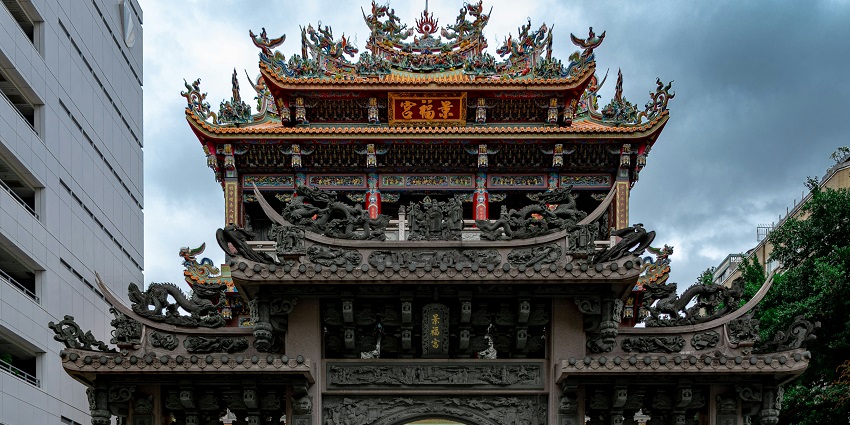
Photo: JUNHØ / Unsplash / Image For Representation Only
Lo Pan Temple is dedicated to Lo Pan, the saint of builders and tradesmen. The temple is significant because it reflects the respect that all tradesmen and builders have in Hong Kong toward their work. The main hall contains a statue of Lo Pan, as well as many carvings and paintings depicting various scenes of traditional crafts. The temple walls include colourful murals of events in Chinese folklore as well as the symbolism of all crafts attached to the building trades. The temple is also closely allied to one of Hong Kong’s working-class communities, and at least once a year, in June, there are ceremonies, celebrations, performances, and offerings given to Lo Pan marking his birthday.
Location: Ching Lin Terrace, Kennedy Town
Timings: 9:30 AM – 5 PM
Nearby Attractions: Belcher Bay Park, Kennedy Town Swimming Pool, Mount Davis Path
Suggested Read: Explore The Top Places To Visit Near China
12. Hau Wong Temple
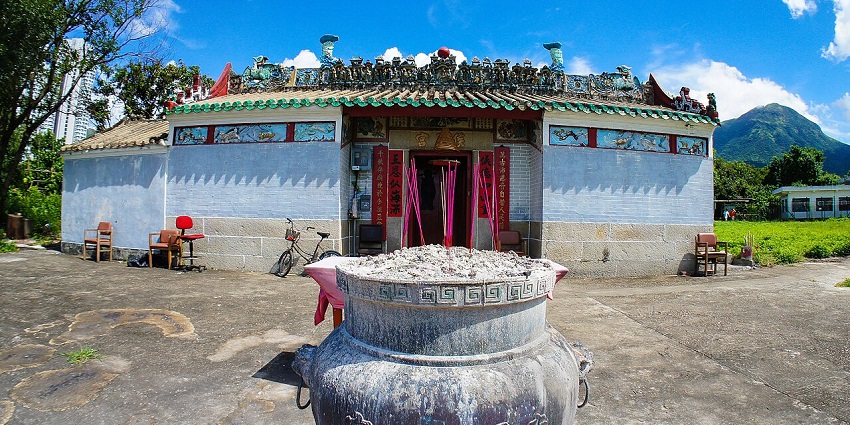
Photo: Mk2010 / Wikimedia Commons
Hau Wong Temple is dedicated to Hau Wong, a title received by a Song dynasty general who was revered for loyalty and protection. Hau Wong Temple’s historical character comes from the ancient stone inscriptions, wooden plaques, and faded murals, which pay homage to the memories of the past. Situated at the back of the temple lies the altar of Hau Wong, and other smaller shrines of various deities tucked away in side halls make this place more than just a shrine. Local communities continue to come here for blessings and practice daily rituals to keep the temple alive.
Location: Kowloon City, Kowloon
Timings: 8 AM – 5 PM
Nearby Attractions: Kowloon Walled City Park, Kowloon City Plaza, Sung Wong Toi Park
The temples in Hong Kong reveal the city’s spiritual depth and cultural heritage. Each one tells a unique story through ancient carvings, deities, and time-honoured rituals. Some are rooted in maritime traditions, while others honour gods of compassion and protection. To explore these sacred sites and uncover hidden cultural gems, plan your journey with TripXL—making your travel experience smooth, enriching, and unforgettable.
Cover Photo: Jamie Street / Unsplash / Image For Representation Only


 WhatsApp
WhatsApp
 Twitter
Twitter
